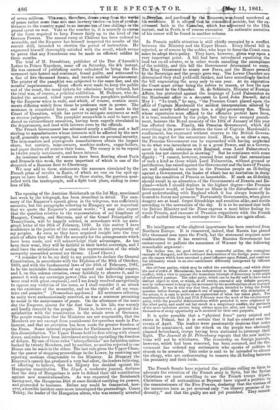In Prussia public attention is still chiefly occupied by a
conflict between the Ministry and the Upper House. Every liberal bill is rejected, as of course by the nobles, who hope to force the Court once more to adopt their policy. They have, however,. given way upon a very important point. A bill had been introduced equalizing the land tax on all estates, or in other words annulling the _exemptinn‘ of the nobility, and this bill the Government determined to carry. The King threatened to create new Peers, and the House pressed by the Sovereign and the people gave way. The Lower Chamber are determined they shall yield still further, and have accordingly limited the bill augmenting the army only to one year. At its expiration the Court must either bring the nobles to reason, or lose the new forces voted by the Chamber. M. de Schleinitz, Minister of Foreign Affairs, has protested against the language of Lord Pahnerston on the Macdonald affair in a despatch to Lord John Russell, dated 'May 1: "In truth," lie says, "the Prussian Court placed upon the affair of Captain Macdonald the mildest interpretation allowed by law, and merely inflicted upon him a slight pecuniary fine. Those whose signatures were affixed to the offensive protest have been, it is true,. condemned by the judge, but they have escaped punish- ment, because the Royal amnesty of the 12th of January of this year has affected them. Finally, the Prusaian Government, which did everything in itS power to shorten the time of Captain Macdonald's confinement, has expressed without reserve to the British Govern- ment its regret for the occurrence itself. How, in so clear a ease, the Prussian Government can be reproached with having neglected to do what was incumbent on it as a great Power, and as a Govern- ment in friendly relations with England, even Lord Palmerston's speech has not succeeded in showing.'.' But he continues with some dignity : "I cannot, however, conceal from myself that accusations of such a kind as those which Lord Palmerston, without ground or justification, has raised against the Government and the laws of Prussia are well calculated to excite in the Prussian people an ill-feeling against a Government, the leader of which has no hesitation in desig- nating the condition of Prussia as lamentable. If such an ill-feeling should result in an alienation of the Governments of Prussia and En- gland—which I should deplore in the highest degree—the Prussian Government would, at least bear no blame in the disturbance of the good understanding with England which it has always honestly la- boured to foster and promote." Fortunately Governments, when grave dangers are at hand. forget friendships and enmities alike, and decide according to the necessities of the day. It is to be noticed that both the British Ministry and the Times express a most hitter feeling to- wards Prussia, and rumours of Prussian coquetterie with the French offer of united Grrmany in exchange for the Rhine are again afloat.






























 Previous page
Previous page